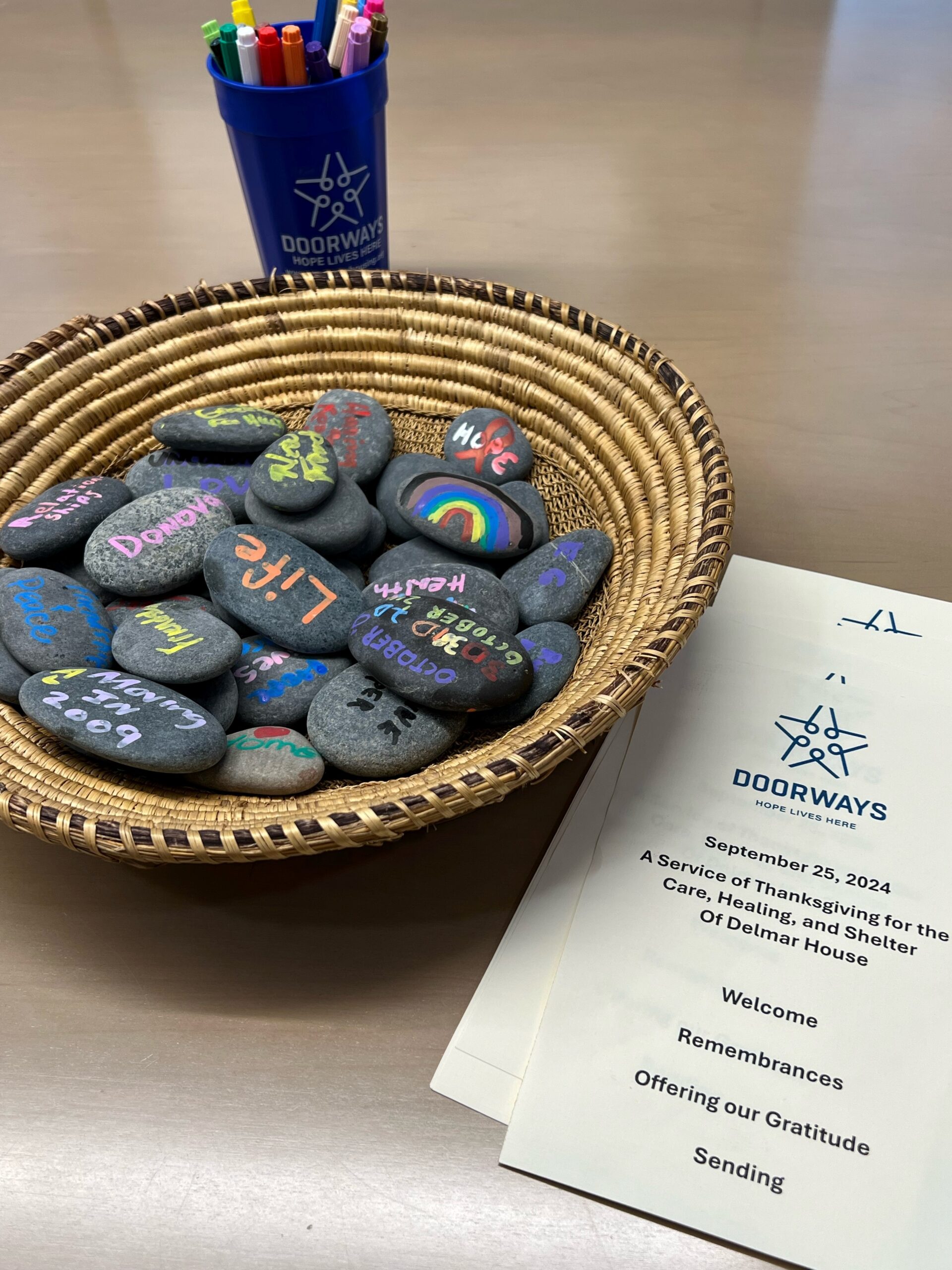Posted January 9, 2025
DOORWAYS | 1101 N. Jefferson Avenue | St. Louis MO 63106
CEREMONY HELD TO HONOR 33 YEARS OF PROVIDING A HOME FOR DOORWAY’S RESIDENTS AS BUILDING DECOMMISSIONED
Residents of the DOORWAYS Delmar building will be relocated to the agency’s new Jefferson Avenue Campus that added 89 new housing units to the community between 2022 and 2024.
St. Louis, MO – Acquired in 1991 as the HIV epidemic was growing, the Delmar apartment building was decommissioned at a ceremony held on Wednesday, September 25, at the property located in the Delmar DivINe from 1 p.m. to 2 p.m. Residents will be relocated to the new Elliott Place apartments on the agency’s Jefferson Avenue Campus. “We designed that new campus to support a pioneering model of care,” explained Opal M. Jones, President & CEO at DOORWAYS. “With 360 degrees of empowerment services co-located with housing, we remove the access and navigation barriers that delay client progress.”
DOORWAYS serves people battling poverty, homelessness, and chronic illness from HIV and other conditions associated with poverty. Many clients also experience mental health and/or substance use challenges as a cause and/or effect of unstable housing and poverty. They face collapse of the environments that support well-being, independence, and opportunity: housing, healthcare, food security, income, education, community. “Our new Jefferson Avenue Campus offers a comprehensive mix of services that will simultaneously stabilize and strengthen these areas in one location, improving client outcomes,” added Jones.
The Delmar building was the first apartment building purchased by DOORWAYS in 1991 to serve as a hospice for people abandoned by family, dying alone and homeless from the frightening new HIV virus. Agency leadership and volunteers who served clients at the Delmar residence shared memories of the early day, the first 10 years of the HIV epidemic. All guests were invited to commemorate the occasion by writing a word on a flat garden stone to capture the contributions and meaning the building brought to the community over its 33 years of service. These stones will be displayed at the new Elliot Place to begin the life of Elliott Place while remembering the life of the Delmar residence.
Elliott Place will open on November 14, adding 39 apartments to the 50 already located on the campus in the Jeff-Vander-Lou neighborhood in North St. Louis. Comprehensive wrap-around services provided onsite include behavioral health and psychiatric care, a Provisions Pantry, career and employment assistance, a multi-media classroom, and intensive 1:1 care coordination. Additionally, a BOCA pharmacy will be available on campus, creating seamless medication services for all at DOORWAYS as well as the surrounding communities.
ABOUT DOORWAYS
Founded in 1988, DOORWAYS provides housing and 360 degrees of wrap-around services to people at the intersection of poverty, homelessness, and illness from HIV. Each year, we serve approximately 3,000 clients and family members in 124 counties spread across Missouri and Illinois. Expanding over the years to meet growing depth and breadth of need,
DOORWAYS evolved from a hospice caring for the dying to an agency building lives for the living. We currently own 12 buildings with 230 apartments offering five housing platforms—emergency housing, flexible housing, assistive housing for those too ill to live independently, permanent housing, and, to prevent homelessness for people in their own accommodations, rent/utility subsidies. Housing is supplemented by empowerment services to cultivate the social determinants of health (housing, health, food security, employment/income, education, community, etc.) that are needed to advance towards a life of opportunity and independence. We use individualized case management, resource referrals, self-development programming, employment support, behavioral health counseling, and psychiatric care. An independent pharmacy will soon open on the campus as well. Through this mix of services to stabilize housing, health, and hope, clients begin their journey toward a more self-directed life. Once housed and linked with their care coordinator, clients are encouraged to comply with an HIV-medication regimen that can help them attain undetectable status. When HIV is undetectable, life span and quality of life improve for the individual. Furthermore, undetectable equals untransmittable (U=U), stopping forward transmission. Bringing an end to new cases of HIV will ultimately eradicate HIV for future generations.
